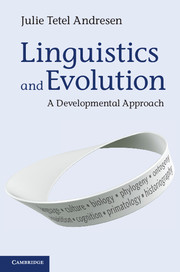Book contents
- Frontmatter
- Contents
- List of Figures
- Introduction Historiography’s contribution to theoretical linguistics
- Part I Theoretical considerations
- Part II A developmental systems linguistics
- 4 Evolutionary scenarios I: the standard story and the self-reproductionist script
- 5 Evolutionary scenarios II: the emerging story and the self-realizationist script
- 6 The ontogenic script begins
- 7 The ontogenic script continues
- Part III What to do next
- Bibliography
- Name index
- Subject index
6 - The ontogenic script begins
Published online by Cambridge University Press: 05 June 2014
- Frontmatter
- Contents
- List of Figures
- Introduction Historiography’s contribution to theoretical linguistics
- Part I Theoretical considerations
- Part II A developmental systems linguistics
- 4 Evolutionary scenarios I: the standard story and the self-reproductionist script
- 5 Evolutionary scenarios II: the emerging story and the self-realizationist script
- 6 The ontogenic script begins
- 7 The ontogenic script continues
- Part III What to do next
- Bibliography
- Name index
- Subject index
Summary
The previous two chapters were devoted to comparing and contrasting alternative evolutionary accounts of language and then producing a developmental-systems-theory-inspired evolutionary script for language/ing. The next two chapters will be devoted to producing a developmental-systems-theory-inspired ontogenic script for language/ing. Building upon Oyama’s idea that evolution is a succession of developmental systems, the chapter opens with a review of some aspects of the human developmental system that might reflect our general primate heritage. The chapter continues with a look at what happens when the developmental system produces an abnormal result, as is the case with Williams’ syndrome. The chapter ends with consideration of what cognitive abilities we wish to attribute to an infant, which topic necessarily engages us in the debate about the relationship between thought and language. It is the goal of the chapter to exemplify a developmental-systems-theory approach to that age-old debate.
Getting off the ground and into the languaging loop
Living beings who are born into this world with a high probability of becoming languaging living beings belong to a lineage of organisms grouped according to the species sapiens, the genus homo, the family hominidae, the order primate, the class mammalia and so forth. The order primate usually garners the most attention from those interested in understanding humans and our place in the world, and discussions tend to revolve around identifying the traits, abilities, behaviors and tendencies that humans do and do not share with our primate cousins. We are currently in a research moment at a far remove from the mid nineteenth century when Max Müller could so confidently declare that “Language is our Rubicon, and no brute will dare to cross it.” New studies seem to be coming out daily to suggest that some previously thought uniquely human ability can either be observed in other primates or taught to them.
- Type
- Chapter
- Information
- Linguistics and EvolutionA Developmental Approach, pp. 165 - 195Publisher: Cambridge University PressPrint publication year: 2013

